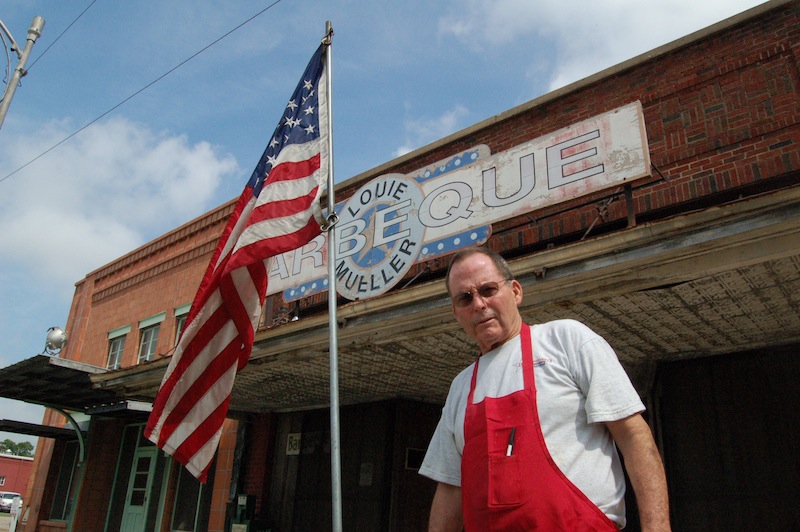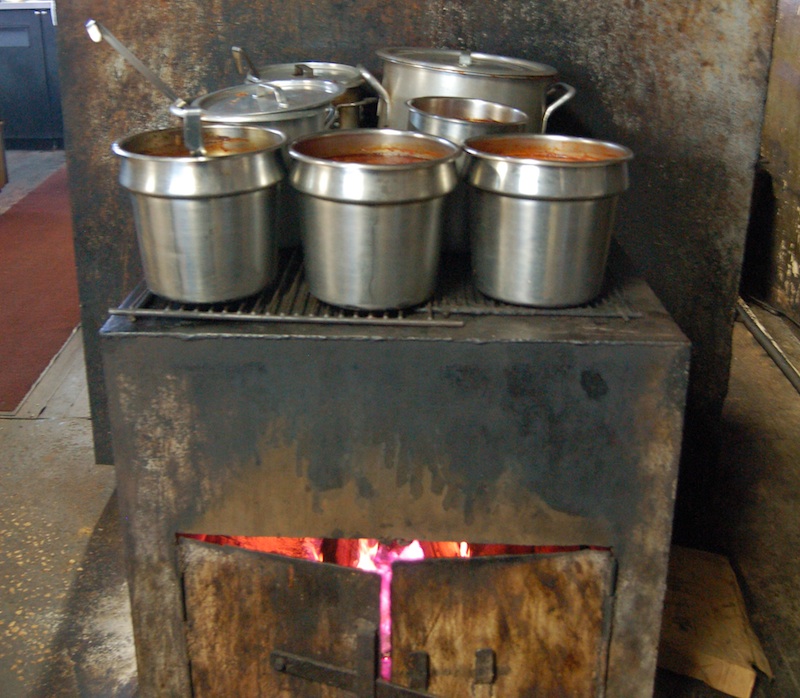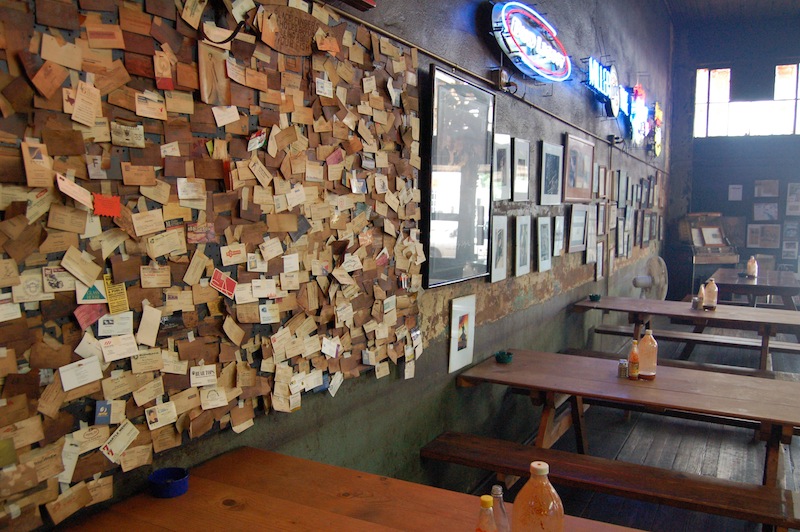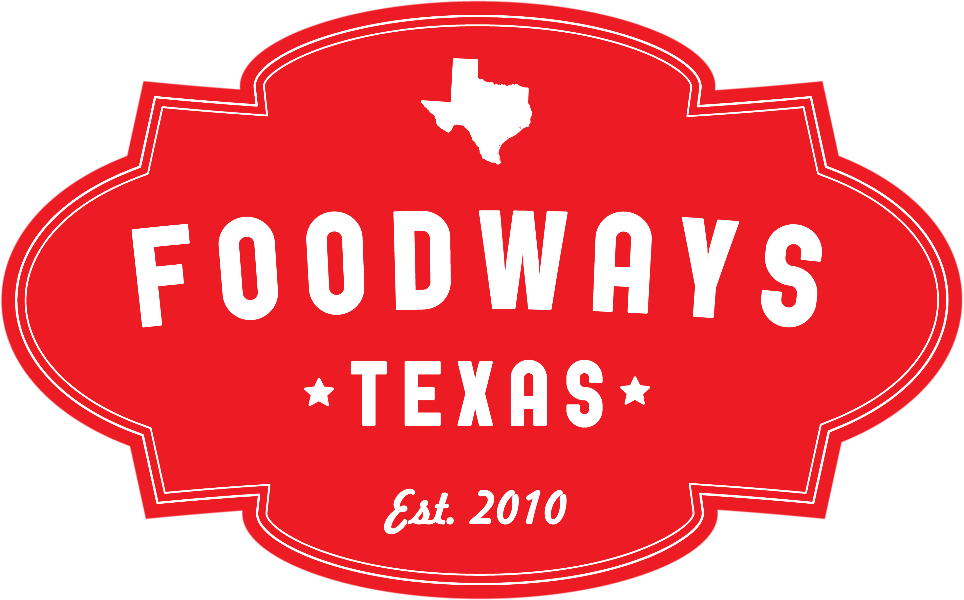Interviewer: Gavin Benke and Carly Kocurek
Location: Louie Mueller Barbecue, Taylor, TX
This interview was originally produced through a collaborative effort of the American Studies Department at the University of Texas at Austin, The Central Texas Barbecue Association, and The Southern Foodways Alliance.
Fieldwork coordinator: Dr. Elizabeth Engelhardt; Project consultant: Amy Evans
It is shared with Foodways Texas as part of a collaboration with the Southern Foodways Alliance to document food stories in Texas.
Bobby Mueller was born in Taylor, Texas, in 1939. Louie Mueller was Bobby’s father, who opened the restaurant and grocery store in 1949. When not in school or in the service, Bobby worked with the family business, which he bought from his father in 1974, around the same time Louie Mueller stopped selling groceries.
It was about this time when Bobby, himself, learned to barbecue. Today, Louie Mueller Barbecue remains a family business. After Bobby’s passing in 2008, his son Wayne took the helm to continue the tradition of quality barbecue in Taylor.Garcia’s Plantation BBQ (since 1987) is a food trailer parked along a busy industrial highway in Richmond, Texas. The twelve-hour briskets are prepped, smoked, and sliced in the tiny confines of the trailer. Fresh scratch-made tortillas, pico de gallo, and fried eggs, round out one of the most inventive tacos in the area.










Gavin Benke (GB): You mentioned, actually, when you’d made some changes, you mentioned that you don’t cook as fast. So, one question that’s definitely—about how long does it take to make your brisket?
Bobby Mueller (BM): Depending on the size, and—depending on the size of the brisket, it’s four to six hours on the average because I like to get—try to get that deal where they’re still not overcooked, still good and juicy, but yet they’re not tough. And, sometimes it works good, and sometimes you have a problem. Sometime you send something out that’s not as tender as the person would look it, but I think most of the time that we hit it pretty good.
GB: And about what time do you all start?
BM: Weekdays between four and four thirty and Saturdays it’s about an hour or two earlier because cooking kind of in shifts on Saturday, like start off then, still by two o’clock in the afternoon, still cooking a batch of meat. It’ll be the last of it the last of it coming off then, and that way we pretty well make it through without selling out.
GB: So, is Saturday big business for you all or is it—
BM: Friday and Saturday, yes—Saturday preliminary. I mean, Saturday has gotten to be the bigger of the two, yes.
GB: All right is it—so, what about the weekday business?
BM: It’s holding pretty steady. You—it’s just you’re subject to, you know, whether the people are traveling or, you know, whether they’re going to come here for lunch or whether they’re going to go to the hamburger joint behind us, or whatever. It’s just, whatev—all-in-all, though, our lunch hours hold up pretty good.
GB: Okay, great, and, uh, I guess as well, with all these sort of cooking techniques, um, can you tell us maybe a little bit more about uh about how you season, or?
BM: Uh, only thing we use is just got a little pot there that put pepper—black pepper in, put a little bit salt in, put some more black pepper in, just mix it up real good, and that’s all we use. Just rub it in the meat, the brisket, pork, the ribs—pork ribs and stuff or steak that we use, don’t rub that, that’s just normal seasoning, but brisket is rubbed and rubbed down good.
GB: And you are actually one of the barbecue joints that serves steaks as well. When did you start introducing—
BM: Always that, we’ve always done that. Actually, that’s—the boneless brisket, as far as we’re concerned, didn’t come in until the ‘60s Everything was sold, uh—because it was coming from the meat market, everything was sold like the roasts and steaks, that’s what was handled. And the brisket at that time was a brisket rib. That was cut, that—and then people kept asking for the boneless, “How come? How come?” And finally, you know, you give into them. If you want to stay alive, you go with what people are asking for. And uh, so, then we cut it down, did the boneless brisket, some steaks, some beef roast, the pork ribs, and now we’ve gone on in to—because of demand, boneless turkey breast, chicken breast, even half fryers, etcetera, that stuff, boneless pork loin, because it’s what people more and more ask for.
GB: And so when that happens, when people start requesting different items, do you have to go out and figure out how you’re going to cook it and prepare it and find suppliers and all that?
BM: Well, you buy it, yeah. And then you just throw it on and watch it. You just learn to cook it, or, you know. It’s—the pork loin is an easy item to cook. Boneless turkey breasts are a little bit on the hard side, because they are lean. You know, there’s no—so, you’ve got to catch them where you don’t dry them out. The breast is still juicy when you’re serving it, so.
GB: And then I guess out of, out of all, when did you guy start adding the turkey and the chicken and all that?
BM: Turkey, well, chicken we started, aw, probably in the late ‘80s and ‘90s, just on weekends. And then, just until recently, started handling it every day, the half chickens. We used to take—took the chicken breast, boneless turkey breast in the last two or three years. It—you know, people really insisted, so.
GB: And then as long as we’re talking about uh the different items, let’s talk about maybe what your favorite is, and—
BM: Uh, I just—anymore don’t really have a favorite I guess, I just, because I just, excuse me, nibble on everything. I like sausage, I guess, because that usually has a different flavor every time, and the brisket. But all-in-all, all of it I like.
GB: Okay, that’s good. And, uh, one thing we should definitely talk about is the distinctive Louie Mueller sauce, which is known as being almost like an au jus.
BM: It’s just a mixture of salt, pepper, uh, tomato ketchup, and, uh, margarine, and bouillon, and just mixed up and it just—it’s not a heavy, heavy—it’s not sweet, no sugar or anything added to sweeten it, and nothing added in to it to thicken it. It’s just that way and it—it’s just something that came about over years, you know.
GB: So, so that’s also changed over the years?
BM: No, that’s pretty well stuck with that. And once it was done, and it’s pretty well been the same. Sometime it might be a little, not noticeably thicker, maybe a little bit, you know, not the heavy sauce, but it might cook down a little thicker than normal or than we usually serve it. But all-in-all it remains about the same texture all the way through, consistency.

